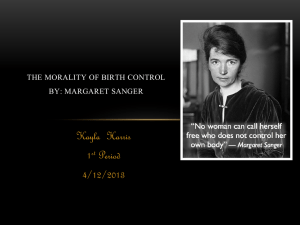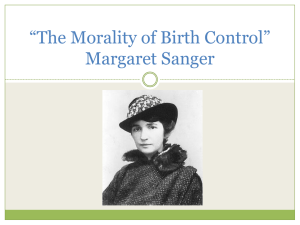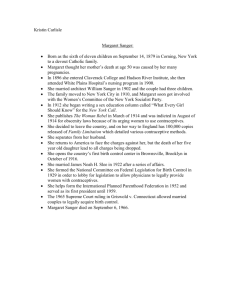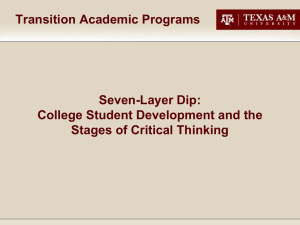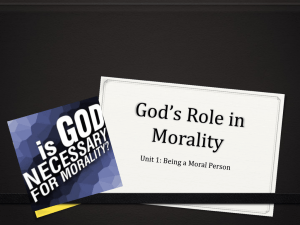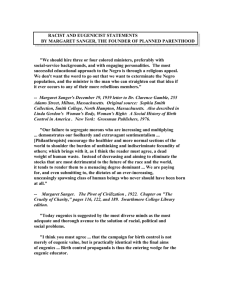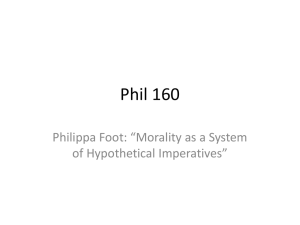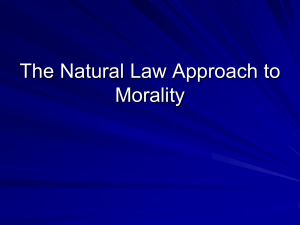The morality of Birth control
advertisement
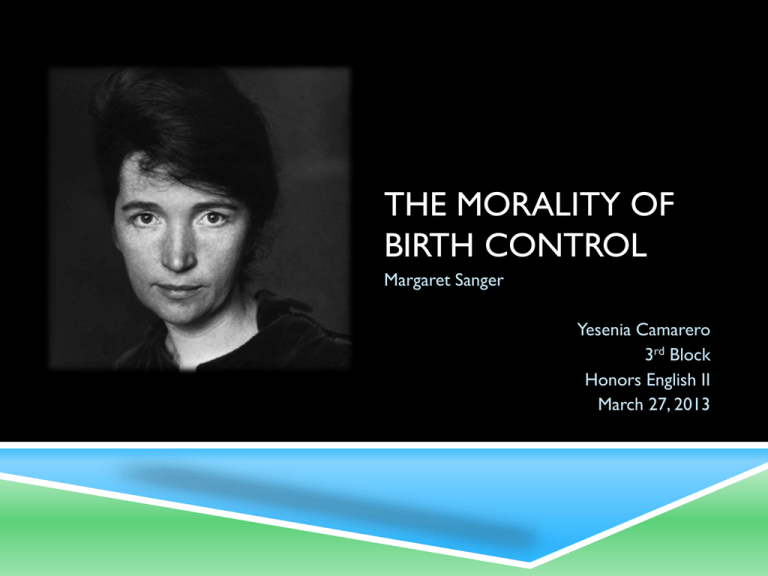
THE MORALITY OF BIRTH CONTROL Margaret Sanger Yesenia Camarero 3rd Block Honors English II March 27, 2013 BACKGROUND 1879 – Born in Corning, New York Her mother died at age 40, which led her to become an obstetrical nurse 1902 – Married an architect named William Sanger, they had 3 children and she became a housewife. A few years later, Sanger returned to obstetrical nursing, helping women on the lower east side of New York VIDEO OF THE MORALITY OF BIRTH CONTROL SPEECH Since this speech was given in the early 1920’s, I wasn’t able to find a video/audio clip of this speech being presented. VIDEO OF ME GIVING THE SPEECH SOAPSTONE - SUBJECT “The one issue upon which there seems to be most uncertainty and disagreement exists in the moral side of the subject of Birth Control.” Essentially Margaret is speaking on what she believes is right and wrong regarding birth control. “. . . in discussing the Birth Control subject in its various and manifold aspects.” In addition, Margaret knows that there’s a variety of perspectives from the people, which is why she discusses many viewpoints. SOAPSTONE - OCCASION “The meeting tonight is a postponement of one which was to have taken place at the Town Hall last Sunday evening. It was to be a culmination of a three day conference, two of which were held at the Hotel Plaza. . .” Margaret’s “The Morality of Birth Control” speech was delivered on November 18, 1921 at the Park Theatre in New York. SOAPSTONE - AUDIENCE “We sent such a letter not only to those who, we thought, might agree with us, but we sent it also to our known opponents. ” Margaret’s intended audience consisted of both people that supported her and the ones that were against her. ”I believed that the discussion of the moral issue was one which did not solely belong to theologians and to scientists, but belonged to the people.” It also included scientists in that field along with theologians that were there. SOAPSTONE - PURPOSE “The reckless abandonment of the impulse of the moment and the careless regard for the consequences, is not morality.The selfish gratification of temporary desire at the expense of suffering to lives that will come may seem very beautiful to some, but it is not our conception of civilization, or is it our concept of morality. ” Margaret is trying to make those listening understand that birth control is moral; she says that it’s not moral to make someone else suffer just for their own temporary satisfaction. “For if they are not able to support and care for themselves, they should certainly not be allowed to bring offspring into this world for others to look after. We do not believe that filling the earth with misery, poverty and disease is moral. And it is our desire and intention to carry on our crusade until the perpetuation of such conditions has ceased.” Margaret explains her supporters view on birth control, as well as her own. SOAPSTONE - SPEAKER “Conscious control of offspring is now becoming the ideal and the custom in all civilized countries.” Margaret Sanger, a birth control activist, is giving the speech and is trying to make people realize that birth control is becoming a norm to other civilized countries. She impacted the world and influenced the world greatly. SOAPSTONE - TONE “We stand on the principle that Birth Control should be available to every adult man and woman. . . Upon these principles the Birth Control movement in America stands.” The tone is strongly worded, determined, and hopeful to make birth control legal to every adult man and woman. MAJOR PREMISE/THEME/MAIN IDEA “We stand on the principle that Birth Control should be available to every adult man and woman. We believe that every adult man and woman should be taught the responsibility and the right use of knowledge. We claim that woman should have the right over her own body and to say if she shall or if she shall not be a mother, as she sees fit. We further claim that the first right of a child is to be desired. While the second right is that it should be conceived in love, and the third, that it should have a heritage of sound health.” Essentially, Margaret stresses to the audience that with the knowledge of birth control, they’re able to limit family size, control population growth and save more lives. ETHOS “We know that the masses of people are growing wiser and are using their own minds to decide their individual conduct.” Margaret considers all perspectives, not just her own, because she knows that as people grow older, they grow wiser. The ethos used in Margaret’s speech were very powerful, since it was such a strong subject. PATHOS “The selfish gratification of temporary desire at the expense of suffering to lives that will come may seem very beautiful to some, but it is not our conception of civilization, or is it our concept of morality. ” By stating this, Margaret emotionally moves the audience, specifically young women. The audience is able to grasp her point of view in a much greater sense. LOGOS “When one speaks of moral, one refers to human conduct.This implies action of many kinds, which in turn depends upon the mind and the brain. So that in speaking of morals one must remember that there is a direct connection between morality and brain development. ” Margaret is giving us her definition of what morality means, which is basically the actions of ourselves. ”Is over-population a menace to the peace of the world? “ She’s implying that if birth control was legalized, women and men would have a choice as to when they want to have children instead of birthing children just because you got pregnant. REPETITION “The church has ever opposed the progress of woman on the ground that her freedom would lead to immorality.” “We ask the opponents of this movement to reverse the methods of the church, which aims to keep women moral by keeping them in fear and in ignorance, and to inculcate into them a higher and truer morality based upon knowledge. ” Margaret repeats herself when saying that the church is what’s holding women back from having a much “realer” sense of morality. PHRASING/MEANING “The third are those irresponsible and reckless ones having little regard for the consequence of their acts, or whose religious scruples prevent their exercising control over their numbers. Many of this group are diseased ,feeble-minded, and are of the pauper element dependent entirely upon the normal and fit members of society for their support. ” She uses the words “religious scruples” to drive home the basic need for power and morality. When Sanger refers to opposition to birth control she refers to them as “this group are diseased, feeble-minded, and are of the pauper element dependent entirely upon the normal and fit members of society for their support.” Her vivid imagery evokes not only emotion, but the need for aggressive action. POWERFUL LINES “We further claim that the first right of a child is to be desired.” The audience pictures a small, helpless child crying, which might remind them of their own childhood; either it was full of love or perhaps it was a miserable experience. “This is a better method, it is a more civilized method, for it involves not only greater forethought for others, but finally a higher sanction for the value of life itself.” The audience may realize that it’s in fact better to prevent the lives that would be unhappy or unhealthy. The use of contraceptives is implying that their life will be better off. “Conduct is said to be action in pursuit of ends, and if this is so, then we must hold the irresponsibility and recklessness in our action is immoral, while responsibility and forethought put into action for the benefit of the individual and the race becomes in the highest sense the finest kind of morality.” The audience would have no room to argue with her definition, because she arrives at It in such a logical and reasonable manner. LITERARY DEVICES USED “While Nature's way of reducing her numbers is controlled by disease, famine and war, primitive man has achieved the same results by infanticide, exposure of infants, the abandonment of children, and by abortion.” This is an example of personification, because it’s saying nature’s way of not over-populating is by disease, starvation, and war. “Conduct is said to be action in pursuit of ends. . .” This is an example of a metaphor, because it’s comparing conduct to action in pursuit of ends. TO FOLLOW… Granted women freedom to control contraception. Founder of Planned Parenthood. Today, couples can control their family size legally. QUESTIONS?
